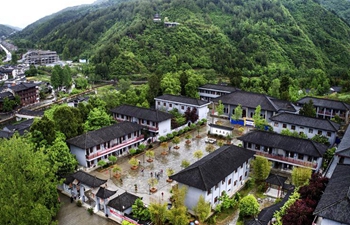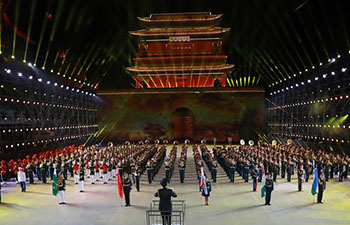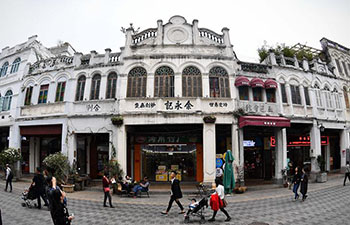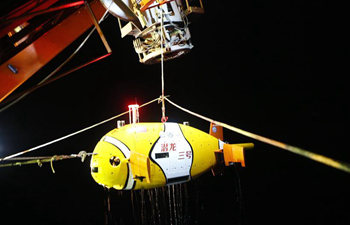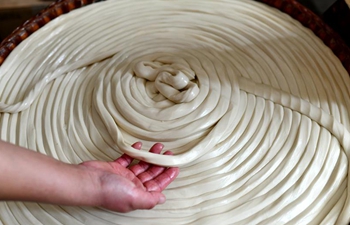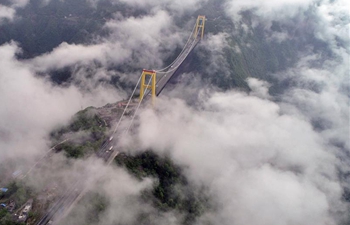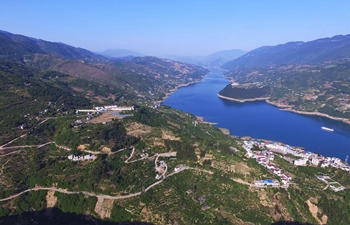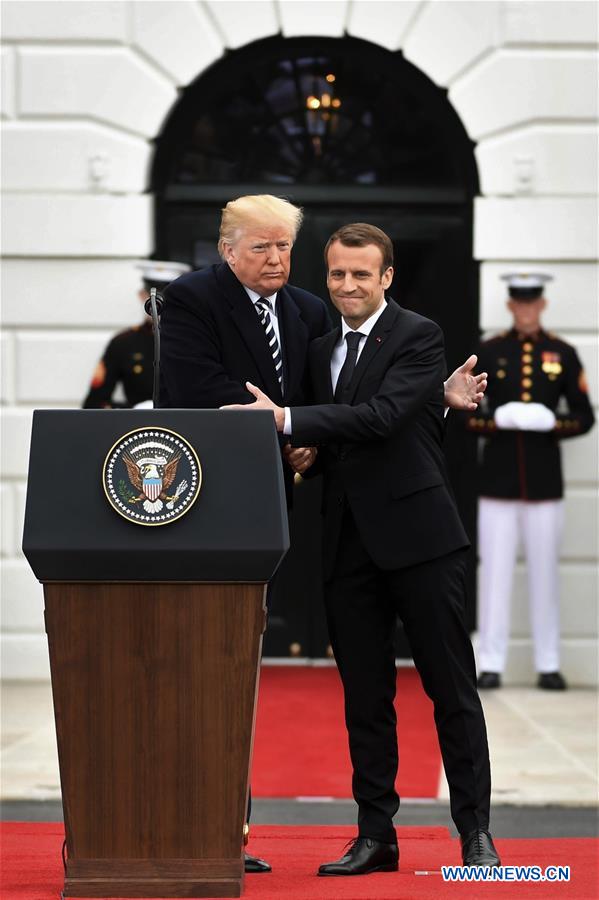
U.S. President Donald Trump (L) and French President Emmanuel Macron attend the state arrival ceremony at the White House in Washington D.C., the United States, April 24, 2018. Visiting French President Emmanuel Macron on Tuesday proposed to work with other parties to forge a new deal on Iran. However, bilateral divergence on Iran and other issues remain as his state visit to the United States drew to a close. (Xinhua/Yang Chenglin)
WASHINGTON, April 24 (Xinhua) -- Visiting French President Emmanuel Macron on Tuesday proposed to work with other parties to forge a new deal on Iran. However, bilateral divergence on Iran and other issues remain as his state visit to the United States drew to a close.
Speaking in a joint press conference with U.S. President Donald Trump, Macron said that the current Iran nuke deal, or internationally known as the JCPOA signed in 2015, was not "sufficient," but "enabled us, at least until 2025, to have some control over their nuclear activities."
"We therefore wish, from now on, to work on a new deal with Iran," said Macron.
NEW DEAL ON IRAN
He further explained that the new deal should cover four topics: to block any nuclear activity of Iran until 2025, to make sure that there is no Iranian nuclear activity in the long run, to put an end to Tehran's ballistic activities in the region, and to generate the conditions for a political solution to "contain" Iran in the region.
However, he denied any change in his stance on the JCPOA, calling the JCPOA "the first pillar" of the framework of the new deal.
"On these topics, I did not change. I constantly said that we needed to find the framework so that, together, and with the powers of the region, and with the Iranian leaders, manage to find a deal," he said.
"I'm not saying that we're moving from one deal to another. I'm saying it is one aspect of the problem. I have never been as critical of the JCPOA as President Trump has, because I believe that we can usefully add to it," Macron noted.
He added that the new agreement will involve European nations, Russia and Turkey.
For his part, Trump said Macron's suggestion is "a pretty good idea," yet remained unsure "whether or not it will be possible to do a new deal with solid foundations."
"Because this (the current Iran nuclear deal) (is) a deal with decayed foundations. It's a bad deal. It's a bad structure. It's falling down. Should have never, ever been made," he said.
Trump will decide whether to leave the JCPOA on May 12. The chance for U.S. staying, judged by Trump's recent pejorative tone towards Tehran and the deal, has been increasingly slim.
"But no matter the decision that President Trump will take, what I would like is to work, as from now, on a new deal with four pillars," said Macron.
DIFFERENCES REMAIN
However, Macron admitted that he still has "a disagreement" with Trump regarding the JCPOA.
"I always said we should not tear apart the JCPOA and have nothing else. I think this would not be the good solution," he said.
As regards the Syrian issue, Trump said he would still like to withdraw the U.S. troops out of the country.
"We're going to be coming home relatively soon. We finished, at least, almost our work with respect to ISIS in Syria, ISIS in Iraq," he said.
However, he added that Washington does not want to give Iran "open season to the Mediterranean, especially since we really control it."
"So we want to come home. We'll be coming home. But... we will have a strong blockage to the Mediterranean, which to me is very important -- because if we don't, you have Iran going right to the Mediterranean. Not going to have that," said the White House host.
He also urged "very rich" regional countries to step up their contributions -- militarily and financially -- in the military operations in Syria, so as "to prevent Iran from profiting off the success of our anti-ISIS effort."
"The United States is embarrassingly into the Middle East," he said. "They have to step up tremendously -- not a little bit, but tremendously -- their financial effort... And they will also put soldiers on the ground, which they're not doing. And we will, in fact, bring lots of people home."




